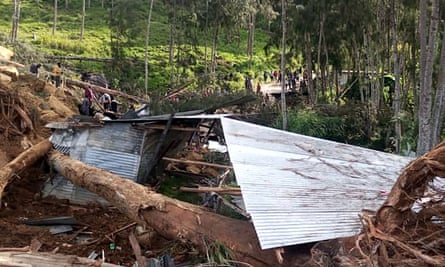The Papua New Guinea national disaster centre has said that Friday’s landslide in a remote village in the northern part of the country buried more than 2,000 people, and has formally asked for international help.
Unstable terrain, remote locations and damaged roads have been hampering relief efforts in the aftermath of the landslide, the United Nations said on Monday.
“The landslide buried more than 2,000 people alive and caused major destruction to buildings, food gardens and caused major impact on the economic lifeline of the country,” an official from the national disaster centre said in a letter to the UN, seen by Reuters and Associated Press.
The Guardian has not been able to independently confirm that figure. It is a sharp rise from earlier estimates, which put the number believed to have been killed in the massive landslide at 670 people. The UN agency earlier said number of possible deaths could change as rescue efforts were expected to continue. Six bodies have been retrieved so far.
Emergency crews, led by Papua New Guinea’s defence personnel, were on the ground in the country’s north on Monday, but heavy equipment required for the rescue had yet to reach the remote village, as the main road remained cut off and the only access was via helicopter.
Papua New Guinea’s government authorities remained focused on clearing debris and improving access to the village, the UN said in its latest update. The agency was preparing to move and distribute food and water, and said it was helping set up evacuation centres.
Social media footage posted by villagers and local media teams showed people scaling rocks, digging with shovels, sticks and their bare hands to find survivors. Women could be heard weeping in the background.
Miok Ala, a resident of Enga province, told the Guardian the land affected by the rockslide remained unstable.
“The hazards represented by potential rock slides are becoming more of a pressing issue,” he said. “The ground is still unstable and the risk is high.”
Ala said as the rescue operations continued, people were crying and calling for help.
“Locals are taking risk and digging down 4 to 5 meters with sticks and spades to locate the dead bodies while in fear of rocks falling,” he said.
Papua New Guinea media on Monday reported that residents had rescued a couple trapped under the rubble after hearing their cries for help.
Johnson and Jacklyn Yandam told local NBC News that they were very grateful and described their rescue as a miracle.
“We thank God for saving our lives at that moment. We were certain that we were going to die but the big rocks didn’t crush us,” Jacklyn said.
“It’s really hard to explain as we got trapped for nearly eight hours, then got rescued. We believe we were saved for a purpose.”
About 1,250 people have been displaced by the landslide, which occurred in Papua New Guinea’s Enga province early on Friday. More than 150 houses were buried and about 250 houses abandoned.
“Many of the houses are buried under eight metres of dirt so if the land doesn’t stabilise then it has to be done predominantly by hand then that will take a significant amount of time,” aid group CARE International Papua New Guinea director, Justine McMahon told the Guardian.
McMahon said in the area, “the vast majority of houses are made out of bush materials so they’re not strong [enough] to withstand a small landslide, let alone something of this scale.”
Water continued to flow under the debris, the UN migration agency said, making it extremely dangerous for residents and the rescue team to clear debris.
Serhan Aktoprak, the chief of the UN migration agency’s mission in PNG, told ABC television that emergency crews would continue to look for survivors until the residents asked them to stop.
Aktoprak said that the rescue team had eight vehicles but that he hoped to receive additional resources soon.
Tribal violence in the region has raised security concerns over the safety of road travel, with the military escorting convoys of rescue teams. Eight people were killed, and five shops and 30 houses burnt down on Saturday, the UN agency said.
Papua New Guinea gave arrest powers to its military in February amid an eruption of tribal violence that saw at least 26 men killed in an ambush.

The landslide hit a section of highway near the Porgera goldmine, operated by Barrick Gold through Barrick Niugini, its joint venture with China’s Zijin Mining.
The Australian government said in a statement it would provide A$2.5 million in humanitarian assistance to support the response.
“In direct response to the Government of Papua New Guinea’s request, Australia will send technical experts to Papua New Guinea to provide incident management assistance, support geohazard assessments, and to inform early recovery efforts,” the statement said.
The statement said it would also provide emergency relief supplies, such as shelter, hygiene kits and specific support for women and children, and support to civil society organisations assisting the response.
“Australia stands by the people and Government of Papua New Guinea at this tragic time,” the statement said.
With Reuters and Associated Press
Source: theguardian.com

















